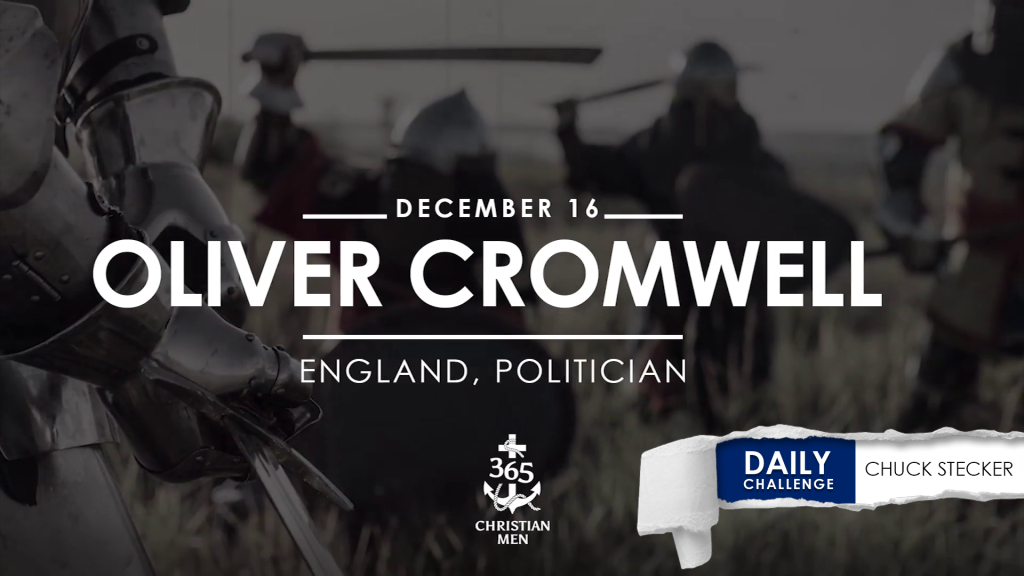December 16. Oliver Cromwell. Cromwell was a politician and Puritan. He believed men could go directly to God without a go-between, and he was willing to defend his belief with his life.
In the 1600s, civil war broke out in England with the Parliament fighting against the King. Cromwell led the Parliament Army. The King believed in his “divine right for absolute authority” and used his station to try to eliminate the Puritans from England. The King and Parliament wanted control of the army. Like any civil war, it was hideous—a country’s people fighting their own.
On this date in 1653, Cromwell became Lord Protector of England—the title one uses to say “I am in charge” when the authority of the king has been denied. Cromwell’s side won, and he lived to fight many more battles. His army loved him, Puritans like John Owen and John Milton supported him, and foreign rulers admired him. But many saw him as harsh, and the Royalists still hated him. Eventually, Cromwell died of malaria.
Two years later, the King’s men dug up Cromwell’s body, hanged it, cut off its head, and hoisted his head on a pole at Westminster Hall. Today’s story is about one of the battles of the civil war.
The duty to protect the vulnerable goes beyond all boundaries.
In the Battle at Marston Moor, 4,000 sons and brothers and fathers and uncles died. The King’s soldiers and the Parliament’s soldiers lay together on the battlefield.
And when the battle finally ended, a few parents and siblings picked their way among the bloody bodies across the field of battle. They searched for their dead; they wanted to bring them home. It had been a hard-fought victory.
With those families, Cromwell—a leader on the Parliament’s side—walked that field.
He thought of his nephew. During the battle, young Walton had been hit by cannon fire. Medical help had arrived, but failed to save the boy’s life. Cromwell would have to write to his sister and brother-in-law. He would have to let them know Walton had died with dignity.
Stepping around a body, Cromwell noticed a young woman ahead, stepping carefully among the fallen. She searched each of the faces. Clearly, she was looking for someone. This was no place for a young woman. Didn’t she know the battlefield was a gruesome place to be?
And it was dangerous. Despite the military presence, looters still polluted the fields. And if she were related to the King’s men … the victorious Parliament might count her an enemy.
He hurried toward her. Whether friend or foe, for her own safety, she had to get off this battlefield.
As he got near, she must have felt his presence for she looked up. And she looked panic-stricken.
But he raised a palm to her and showed what compassion he could in his face. He saw her panic dissolve into grief. Overwhelming loss.
Poor child. Cromwell asked her name.
She was called Mary. Wife of Charles Townley of Lancashire—a member of the King’s Army and from a prominent Catholic family. The people Cromwell’s side had defeated in battle the previous day.
Though he knew the awful answer, he asked about her business at the battlefield.
She was searching for Charles’s body.
Cromwell listened to her intently, and he recognized the kind of sorrow she had. That was all he needed to know. The woman could not bring her Charles back, and many of the dead had already been buried. She risked her life just being there, especially with her connections to the King.
Despite her bravery, he gently urged her to seek the safety of her home. Not only would she find the close-up view of the horrors of war traumatizing, but she could easily be attacked or killed. He implored her to think of her own safety, to return to the family who needed her, especially now. It didn’t take long to convince her to go home. She complied and turned back to find the road.
But Cromwell would not let her go alone. Vagabonds and looters threatened even outside of the fields. So, he called for one of his own troopers, one he trusted, to escort her back and make sure that no one would harm her. The trooper arrived, mounted her on his horse, and set off.
Cromwell didn’t tell her his name. There was no need to frighten her. Would she have accepted his help if she knew he was one of the leaders of Parliament’s armies? He didn’t know. Nor did it matter. What mattered was that she got home safely. And when his trooper returned to confirm Mary’s safe return, Cromwell was satisfied. Too many had been lost in the Battle of Marston Moor, but at least one life could be saved.
“A father to the fatherless, a defender of widows, is God in His holy dwelling” (Psalm 68:5 NIV).
Think of someone you know who may lack a protector. How can you be there for them? The duty to protect the vulnerable goes beyond all boundaries.
Hood, Edwin Paxton. Oliver Cromwell: His Life, Times, Battlefields, and Contemporaries. New York: Funk & Wagnalls, 1883. Accessed January 16, 2019. https://archive.org/details/olivercromwellh01hoodgoog.
Morley, John, M.P. Oliver Cromwell. New York: The Century Co., 1900. Accessed January 16, 2019. https://archive.org/details/olivercromwellby004057mbp.
Story read by Chuck Stecker





